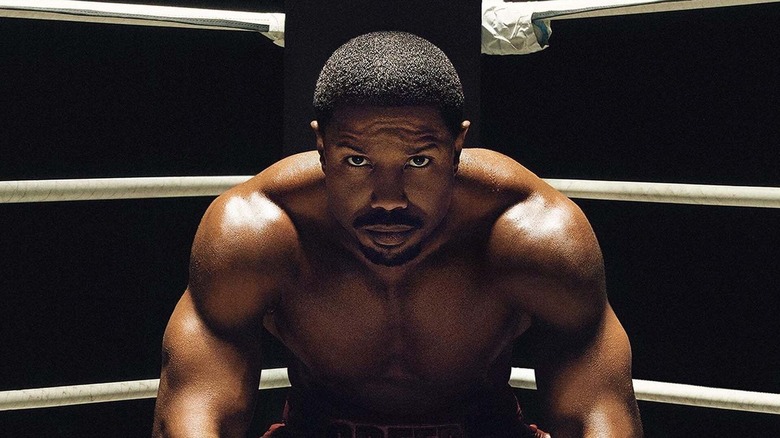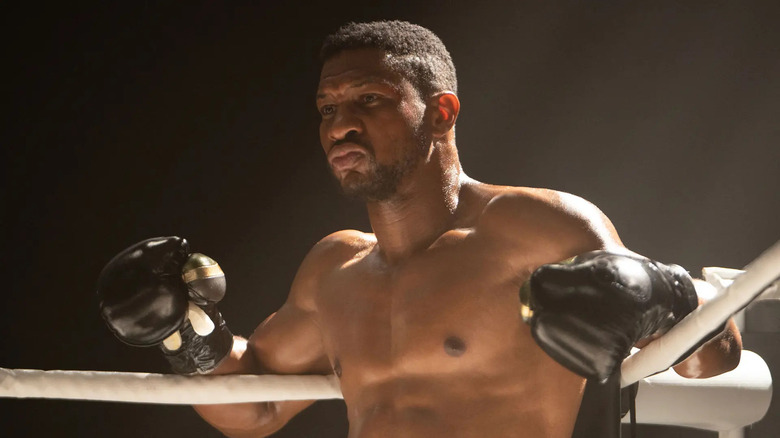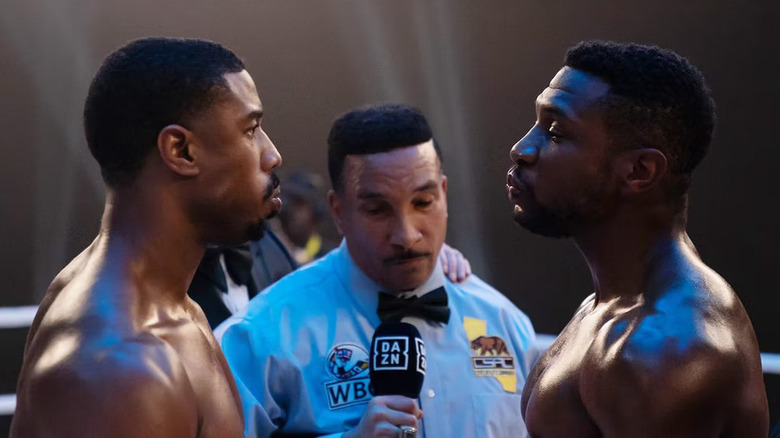Creed III Review: No Sly Stallone, No Problem
- Maintains much of the prior films' consistent quality
- Jonathan Majors' presence
- Some of Michael B. Jordan's directorial choices
- Muddled themes
After six "Rocky" films and two of the previous "Creed" spin-offs, Sylvester Stallone has fully stepped away from this new fork of his own long-running franchise. But his absence is barely felt here, as the series' new star Michael B. Jordan is following in Stallone's footsteps by directing this third entry of the boxing saga himself.
"Creed III," penned by "King Richard" scribe Zach Baylin and Keenan Coogler (who just so happens to be the brother of "Creed" helmer Ryan Coogler), captures what worked about the first two films while distancing the narrative from having to rely too heavily on nostalgia and a connection to the mythology of the earlier "Rocky" films. Instead, the narrative digs into Adonis' own past to find a new foe in his estranged childhood friend Damian Anderson, played with gusto by Jonathan Majors.
The film carries on a long-running tradition of intermingling melodrama and pugilism with aplomb, which itself is so no easy task. Boxing is a far less relevant sport than it was in the heyday of the "Rocky" films. Those same films ran a winning formula into the mud. Going into this, it was hard to imagine they could wring much more out of this particular piece of IP. But with strong performances, some compelling fights, and the trademark heart these films have always hung their laurels around, "Creed III" delights more than it doesn't. One does have to wonder, however, whether future installments will keep Jordan in the director's chair, or if this was a one-off experiment with mixed stylistic results.
Return of the king
When "Creed III" opens, Adonis is fighting his retirement bout, a rematch in South Africa against his rival from the first film, Ricky Conlan (Tony Bellew). He's ready to lay down his gloves and continue his career in the sport as a promoter instead of a fighter. Adonis has had a storied career between films, is rich beyond his imagination, is married to a rock star (Tessa Thompson returning as his wife Bianca), and has more time to spend with his daughter Amara (Mila Davis-Kent). But as pleasant a facade as this happy ending looks, deep down he's still a man with a lot of unprocessed trauma who has never had to learn to deal with his emotions outside of the ring.
He's forced to do just that when Damian (Jonathan Majors) reappears in his life. The two were close as kids, but Damian has spent the last 18 years behind bars for a crime relating to Adonis whose particulars the film keeps a mystery for much of the runtime. All that matters is that Damian was once Adonis' closest mentor and the closest thing to a family he had ever known and in Damian's mind, Adonis has gotten to live out his dream life at Damian's expense.
Their murky relationship provides a lot of the drama early on, as Jordan and Majors dig into some of the unspoken conflicts between the two men. There's a particularly moving sequence set at a diner where Adonis, without thinking, offers Damian aid in a tone that sounds suspiciously like charity. The pride and disgust on Damian's face say that this isn't the kind of help he wants. He wants a shot at the world title, currently sitting around the waist of a young fighter Adonis promotes.
Without digging too deep into spoiler territory, Damian pressures Adonis, utilizing his ample guilt against him, into getting him on the map in the boxing world. When he demands a title shot in what would be his first professional fight ever and Adonis reminds him how impossible it is, the audience is left to ponder Rocky's origins, and Adonis' own, and see that it's not impossible, but rather a specific set of lucky circumstances that were afforded these two protagonists but not Damian.
All of this gets wrapped up in Adonis being distant at home, Amara getting into fights at school because she wants to be just like her dad, and Damian bonding with Bianca over the two being sidelined from their respective dreams, him by prison and her by her hearing loss. The drama mounts within a logical direction that should result in Adonis seeking professional help and talking out his feelings and repressed issues, but doesn't, because this is still a "Rocky" film, and circumstances perfectly align in such a way that Adonis doesn't need therapy. He just needs to beat his former best friend in an epic boxing match in the third act. As one does.
Family business
On a thematic level, the central issues between Adonis and Damian are so compelling because, even though he's clearly been twisted by his experiences, Damian has a legitimate beef with Adonis. But in exploring their diverging journeys in life, "Creed III" shies away from tackling the class divide between them head-on. Yes, Adonis had a lot of luck on his side, but most of that luck is because he was Apollo Creed's son, and Mary Anne (Phylicia Rashad) plucked him out of the difficult life he was otherwise destined to live. The script has a "story by" credit for Ryan Coogler, and there are a lot of similarities in Damian's arc to Jordan's own as Killmonger in the first "Black Panther," film, but here there is an even more direct path to earnestly blaming the hero for the foibles of the villain.
The choice to blow all of those suppressed issues off in a climactic boxing match is par for the course of these films, but the approach Jordan takes in staging that fight detracts from its dramatic power. Elsewhere in the film, he avails himself nicely as a director. He possesses a steadier hand in working with the actors in the scenes he is not directly in, and his performance suffers compared to the two films where he wasn't wearing so many hats on set. But aside from some interesting framing in a few scenes, much of his presence is felt in the more fantastical way the fights are filmed.
"Creed" took a more docudrama approach, visually, and "Creed II" veered into a more heightened look at the violence. But here, Jordan strikes the distance between the chess-match-focused details of Guy Ritchie's "Sherlock Holmes" films and a litany of anime influences the director has name-checked himself in interviews. The opening bout and the shocking brawl in the second act make the drama of the fight more fascinating and the carnage more terrifying. (The anime influence can also be seen in having Baby Drago, the villain of "Creed II" reappear as a Vegeta-esque ally in a training montage.)
But for the final fight, Jordan gets a little too abstract with it, experimenting wildly with making the match feel like a dream sequence. It doesn't always work and it feels ill-fitting compared to something like the final match in Gavin O'Connor's "Warrior," or a really good Wrestlemania main event. The epilogue also proves a little too tidy given how messy and complex the relationships leading into it have been.
However, it's hard to deny the scratching of that specific "Rocky" itch. Everyone involved here has proven that the "Creed" films can continue on without the shadow of Stallone looming too much, so long as they continue to find problems Adonis can reasonably resolve with his fists and performers willing to get absolutely jacked for him to take those issues out on.
"Creed III" hits theaters on Friday, March 3.


